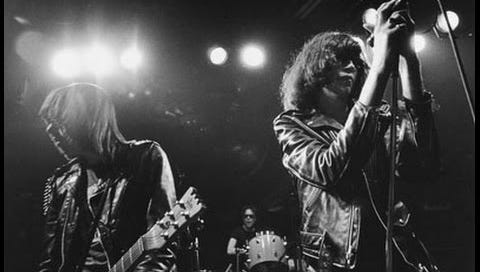Unifying Outsiders
A recent discussion about the camaraderie people feel when they go to a shooting range reminded me of one of my favorite Ramones songs, "Outsider." It's a catchy tune (aren't they all?) that speaks of the alienation (don't they all?) that misfit kids feel. Kids, even "outsider" kids, tend to find each other, and that tendency continues into adulthood. This "finding each other" often happens through mechanisms, mechanisms that become both foci and loci. Music is a common and powerful one, and the Ramones were pioneers of the American punk rock movement that drew so many disaffected and awkward kids and gave them (forgive me) a "safe space."
This phenomenon - using a common interest to find the like-minded - isn't restricted to outsiders, misfits, or those who feel they don't fit some norm. Sports fandom serves, interest in fashion serves, book genres serve, as do countless other interests, hobbies, and activities.
The element of "outsider-ism," however, is not prevalent in mainstream associating. Consider what I've mentioned so far: target shooters (or gun owners in general) and Ramones (or punk rock in general) fans. Both groups exist as not-norms as far as the "mainstream" goes. Mainstream culture tells us that we should distrust guns, that we should favor gun control, and that we should look at gun owners and gun advocates with disdain. Punk rock, when it first arose, was looked at much in the same way by mainstream culture, before being feted (after being scrubbed of its dirt, stink, and danger well after-the-fact). While punk did "mainstream" (thought hardcore stayed underground), the same suspiciousness and distrust was cast at heavy metal music in its wake. Outsider-ism can also be found among motorcycle riders (and not just the criminal gangs), to add a third example.
Consider what takes place inside these worlds. I am both a gun owner (well, I was until that tragic boating accident) and a metalhead. I have witnessed both worlds from within, and contrary to the stereotypes put forth by those not of those worlds, those crowds are replete with people who are nice to each other, happy to see and be associated with each other, ignore the supposed divisions of race or ethnicity, and recognize that their outsider status is a unifying force.
Indeed, the more the rest of the world tells metal heads or gun owners that their interest is not normal, the greater the solidarity those metal heads and gun owners develop, and the differences that might otherwise breed some division never come to play. It's a solidarity born of positivism and a feeling of being misunderstood. As the Ramones song goes,
Everybody tried to push me
Push me around
Everybody tried to put me
Try to put me down.
Keep doing that to a group that considers such mistrust and negative judgment undeserved, and the group will unite, put up its walls, and write you off.
It's important to recognize that such outsiders are not necessarily small fringe groups. Thirty percent of Americans own a gun, and another thirty-five percent could see themselves owning a gun. Heavy metal is a worldwide phenomenon, with one registry identifying over 170,000 bands, and by some measures it's more popular than pop music, despite a total lack of airplay by broadcast radio. Outsider status is a function of the cultural mainstream, not one of small numbers. Indeed, some of the most “in” groups have minuscule populations.
The progressive Left is currently ascendant in the ongoing culture wars. It dominates the cultural mainstream, and its views also dominate Corporate America and the political sandbox. However, its groveling obeisance to its fringe, to the never-satisfied scalp-hunter social media mob and academic loons is undermining that ascendancy. That fringe demands that the "outsiders" continue to be characterized with suspicion, disdain, and exile. With what result? The same strengthening of resolve and the same coalescing of "us vs them." That's reinforced when the extremists within outsider groups are presented as the norm. Yes, there are violent thugs who listen to heavy metal, but they are not remotely the norm. Yes, there are gun-owning criminals, but they are not remotely the norm. And, yes, there are raging racist white supremacists who supported (and still support) Trump, but they are not remotely the norm. I know a lot of Trump supporters, and I wouldn't characterize a single one of them as a Nazi or a fascist. They're nice people, people who are fed up with being ignored, dismissed, steamrolled by the politico-cultural elite, and told they're racists/bigots/fascists. I'm in serious disagreement with some of their policy positions, and sometimes disappointed by their reflexive defense of his excesses and transgressions, but that doesn't change how I feel about them as people.
Absolutist excoriation and the unification it fosters create no benefit for those who want to move forward in a unifying fashion. All that happens is that the "outsiders" ignore you or look with suspicion of dishonesty or nefarious intent at any criticism or argument you put forth. The pressure motivates them to circle the wagons, rather than consider criticisms. It's like saying "gun owners are murderers" or "metal sucks." Who in their right minds would think that's a way to open a dialogue?
If you enjoy The Roots of Liberty, please subscribe (if you have already, thank you!), and please recommend the blog to your friends! While I share it as much as I can on social media, subscribing ensures you won't miss a post.
If you really like The Roots of Liberty and want to help keep it rolling, please consider becoming a paying subscriber here at Substack, or at a lighter level as contributor to the blog via Patreon.
Thank you for your support!
Yours in liberty,
Peter.




